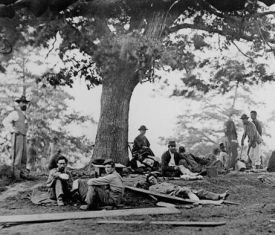Today is marked by minor skirmishes and battles in the relentless push by Union armies to concurrently reach the Confederate capital of Richmond and the strategic city of Atlanta, Georgia.
Meanwhile, many Baptist congregations of the South have thus far failed to discuss the war in their record books, a reflection, to no small degree, of the traditional Baptist principle of church state separation. Of those who do address the war in some manner or another, it is not unusual for such recognition to be rather late in the coming, particularly in regards to the deaths of soldier members. Such is the case with the North Catawba Baptist Church of Lenoir, North Carolina.
Sydney McCall, a former member of the congregation, died in the Battle of Sharpsburg (or Antietam) on September 17, 1862. In the month prior to his death, McCall had written to his wife, Mary, expressing thanks to his “maker” for the opportunity to write the letter. Mary later learned of her husband’s death through a brief letter penned by a soldier friend of McCall’s, a manner in which many soldier widows learn of the deaths of their husbands during the war.
Yet it is not until this month that the couple’s church, the North Catawba Baptist Church, acknowledges McCall’s death with a resolution:
Whereas having learned with regret the death of Brother sidney McCall a worthy and exemplary member of this church, who fell in defense of his country in the battle Sharpsburg, Maryland.
Not only has the country lost a noble and valiant soldier, but the church has sustained an unreparable loss in the death of this pious and noble brother who we believe was faithful in the discharge of Christian duties, endeavoring to adorn the doctrine of God our Savior in all things.
Therefore, Resolved that we hereby tender our heartfelt sympathy to his afflicted and bereaved wife, in the loss of a tender husband, praying that God may sustain her in this her sore trial that she may not sorrow, as those who have no hope.
Resolved this preamble and resolutions be entered on the church book and a copy of the same to sent to his bereaved wife.; While his wife, the church and the friends have sustained a loss that can never be replaced, still we trust that this loss is his eternal gain.
How Mary McCall may have felt in the nearly two years in which it takes her church to formally offer such consoling words is unknown. Well may there have been much informal discussion among church members during this time as to whether or not to formally acknowledge the loss of McCall in the war. Regardless, Baptist congregations suffer their own battles during the war, conflicts that often take the form of mourning for earlier war time losses, while at the same time fearful of what the day’s news might bring.
Sources: Jim Herman, “Sydney McCall (1828 – 1862)” (link); also see Bruce T. Gourley, Diverging Loyalties: Baptists in Middle Georgia During the Civil War, Macon, Ga.: Mercer University Press, 2011 (link)



